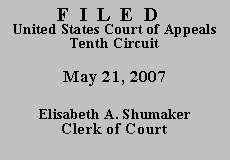

After carefully reviewing his pleadings, on August 11, 2006, the District Court for the District of New Mexico dismissed Mr. Hennelly's suits against the state officials for failure to state a claim. A month later, the district court dismissed Mr. Hennelly's claim against his former wife as well and denied his request to amend his complaint. The court recognized that at such an early stage of litigation, dismissal is appropriate only when the plaintiff "can prove no set of facts in support of his claim to entitle him to relief." Morgan v. City of Rawlins, 792 F.2d 975, 978 (10th Cir. 1986). It was careful to construe Mr. Hennelly's pleadings liberally, in keeping with the plaintiff's status as a pro se litigant. Haines v. Kerner, 404 U.S. 519, 520-21 (1972).
The district court ultimately concluded that New Mexico State Court Judge Barbara Vigil and Hearing Officer Margaret Kegel were entitled to absolute judicial immunity, as Mr. Hennelly's allegations concerned actions Judge Vigil and Officer Kegel took in their judicial capacities within the jurisdiction of the state court. Mireles v. Waco, 502 U.S. 9, 13 (1991). The district court found Sharon Pino, the guardian appointed by the New Mexico court to represent Mr. Hennelly's minor child, would qualify for quasi-judicial immunity if she acted under color of state law. But the court correctly noted that we have held the guardians ad litem are not state actors for purposes of 1983, because they give their "undivided loyalty to the minor, not the state." Meeker v. Kercher, 782 F.2d 153, 155 (10th Cir. 1986). Therefore the district court found Ms. Pino was not susceptible to suit under 1983. For a similar reason, the court dismissed the claim against Mr. Hennelly's former wife: she is a private citizen, the court held, not acting under color of state law.
Finally, the court found that a pair of jurisdictional doctrines prevent a federal court from granting relief in any event. The Rooker-Feldman doctrine, see Rooker v. Fidelity Trust Co., 263 U.S. 413 (1923); District of Columbia Court of Appeals v. Feldman, 460 U.S. 462 (1983), precludes inferior federal courts from reviewing the final decisions of state tribunals. See Crutchfield v. Countrywide Home Loans, 389 F.3d 1144, 1147 (10th Cir. 2004). In the alternative, if the state-court judgment against Mr. Hennelly is not final, the Younger abstention doctrine prevents the federal district court from interfering in an ongoing state proceeding. Weitzel v. Div. of Occupational & Prof'l Licensing of the Dep't of Commerce of Utah, 240 F.3d 871, 875 (10th Cir. 2001). Either way, the federal courts lack jurisdiction.
After reviewing the district court's opinion de novo, see Guttman v. Khalsa, 446 F.3d 1027, 1031 (10th Cir. 2006), we AFFIRM the judgment of the district court for the reasons articulated in its two dismissal orders. In light of the court's thorough analysis there of the relevant facts and law, we find no need to elaborate. Accordingly, Mr. Hennelly's appeal is DISMISSED.
Appellant's motion to proceed in forma pauperis is also DENIED.
Entered for the Court,
Michael W. McConnell
Circuit Judge
*.After examining the briefs and appellate record, this panel has determined unanimously that oral argument would not materially assist in the determination of this appeal. See Fed. R. App. P. 34(a)(2); 10th Cir. R. 34.1(G). This case is therefore submitted without oral argument. This order and judgment is not binding precedent, except under the doctrines of law of the case, res judicata, and collateral estoppel. It may be cited, however, for its persuasive value consistent with Fed. R. App. P. 32.1 and 10th Cir. R. 32.1.